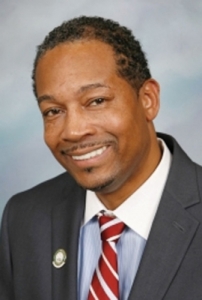Councilman residency issue inches closer to being sorted
By Rochelle Moore
Published in News on May 12, 2018 9:25 PM

Williams
Councilman Antonio Williams is close to having his Center Street property cleared for residency, a move that could potentially lead the councilman to retain his seat on the Goldsboro City Council.
Williams' residency has recently come under fire, following complaints by residents to the council and a subsequent probe seeking to confirm Williams is legally holding his seat.
In order to represent District 1 on the council, Williams is required to live in District 1, according to state law. When questioned by the city's attorney, Williams declined to reveal his address due to concerns regarding his safety.
He recently presented the council with a signed affidavit that states he is living in District 1 but the sworn document declined to offer an address -- a point of concern voiced by members of the council, including Councilman Gene Aycock and Councilman David Ham.
The affidavit states that Williams is living with relatives in an area of District 1, at a location that is north of Ash Street, west of North Center Street, east of U.S. 117 and south of West Hooks River Road.
He also states that he does not believe he needs to disclose his residence, which is a matter of public record.
". . . I do not believe there is a valid basis for the mayor, the city council or any private citizen to demand its disclosure," Williams said in the affidavit.
The council took up the issue in late April and initially decided to give Williams 48 hours to provide verification of his residence, by April 27. If not, he was positioned to potentially lose his seat. State law, in N.C. General Statute 160A-59, requires a council member to live in the district he or she represents. Failure to live in District 1 would lead to Williams automatically losing the seat.
The council sought to verify Williams' address to determine if he was legally holding his seat.
In the 11th hour, Williams retained an attorney with the Southern Coalition for Social Justice and threatened to sue the city if he lost his elected post.
His attorney and the city's attorney concluded that Williams, as an elected official, has the right to due process, according to N.C. General Statute 128-6.
Due process could involve a Wayne County Board of Elections hearing, which would be triggered only if a voter registration challenge were filed by any Wayne County resident.
The city council could also decide to have amotion proceeding, where it takes on a quasi-judicial role, to also seek resolution regarding Williams' residency. During its May 7 meeting, the council declined to move toward an amotion proceeding and dropped the issue.
After the meeting, Ham and Aycock said the possibility exists that a county resident may file a challenge with the Board of Elections.
To date, no one has submitted a challenge but several people have called the elections' office inquiring about the process, said Dane Beavers, Wayne County Board of Elections director.
"Nobody wanted to put their name on the docket so far," Beavers said.
Due to the May 8 election race, the Board of Elections is not accepting any written challenges because voter registration documents are considered closed. Registration challenges can be submitted in writing after the May 18 canvass of the votes.
If a challenge is submitted, the elections board will hold a preliminary hearing to determine if there is probable cause to conduct a formal hearing, said Patrick Gannon, State Board of Elections public information officer.
At the hearing, the person who filed the challenge would need to present evidence.
"The burden is on the challenger in the voter registration challenge," Gannon said.
The Board of Elections, which takes on a quasi-judicial role in the hearing, makes a determination on whether a person retains or loses their voter registration. The board's decision can be appealed to the State Board of Elections, Beavers said.
Residents who end up losing their voter registration status can also become registered again -- without any lapse in time -- by simply verifying their address on a voter registration form, Beavers said.
To qualify as a candidate for an elected post, a person needs to be registered within the district where they are running for office and a person's residence is where they sleep at night, according to N.C. General Statute 163A-842, Beavers said.
"A residential address is where you lay your head at night," Beavers said.
In Williams' affidavit, which he signed on May 7, he states that he plans to make his property at 143 N. Center St. his permanent residence after the downtown building is approved for residency.
Allen Anderson, Goldsboro chief building inspector, said the second floor of the property is close to receiving its final inspection approvals as a residence.
"It looks like to me, he's close," Anderson said.
In July 2015, Williams listed 143 N. Center St. as his residence and changed the address to 304 Wilmington Ave., in September 2015. No changes have been made since that time, according to Board of Elections records. Williams has confirmed that he is no longer living at the Wilmington Street address.
In the affidavit, Williams said he considers the Center Street building his future residence, where he keeps many of his belongings.
Preliminary electrical, mechanical and plumbing inspections have been approved for the property, Anderson said. Williams has a list of work items to complete before the final inspection approvals are finalized for the building, mechanical items and plumbing.
"He's just finishing up," Anderson said. "He's just got a few more things to do. The building is pretty much done."
